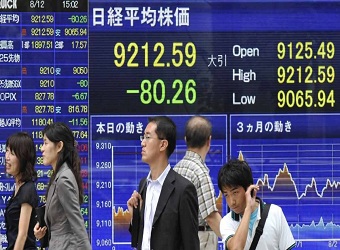Asian markets fell across the board on Monday, following a sharp decline in U.S. stocks on Friday on a stronger-than-expected jobs report that sent interest rates higher.
In Australia, the ASX 200 fell 100.90 points, or 1.65 percent, to 6,020.50, with all sectors declining. The heavily weighted financial subindex was down 1.44 percent, while the energy and materials sectors fell 2.68 percent and 2.22 percent, respectively.
The biggest banking names in the country fell: Shares of ANZ were down 1.44 percent, Commonwealth Bank declined 1.41 percent, Westpac was down 1.32 percent and the National Australia Bank fell 1.45 percent.
Major Australian miners were also down. Rio Tinto shares fell 2.16 percent, Fortescue was down 0.4 percent and BHP Billiton declined 2.27 percent.
In Japan, the Nikkei 225 fell 2.34 percent in afternoon trade, while the Topix index was down 2.12 percent. South Korea’s Kospi index fell 1.34 percent. Chinese mainland markets were also lower, with the Shanghai composite down 0.19 percent in afternoon trade. The Shenzhen composite fell 0.77 percent. In Hong Kong, the Hang Seng index declined 1.67 percent.
Chinese mainland markets were also lower, with the Shanghai composite down 0.19 percent in afternoon trade. The Shenzhen composite fell 0.77 percent. In Hong Kong, the Hang Seng index declined 1.67 percent.
Elsewhere, U.S. futures fell as Wall Street looked to add to the large losses set last week.
The Dow Jones industrial average futures were down 116 points at 1:03 p.m. HK/SIN, after briefly falling more than 250 points. S&P 500 and Nasdaq futures fell 6.25 points and 10.25 points, respectively.
On Friday, the Bureau of Labor Statistics said the U.S. economy added 200,000 jobs in January. That number was higher than the 180,000 jobs expected by economists in a Reuters poll. Wages, meanwhile, rose 2.9 percent on an annualized basis. The report sent Treasury yields higher, adding to investor concerns that interest rates may be rising too fast.
One analyst said the move in the U.S. market still had some way to go — and that the pullback would continue to affect most equity markets.
“The past week has seen shares come under pressure as Fed rate hike expectations increased, partly reflecting an acceleration in U.S. wages growth, and the bond yield rose sharply,” Shane Oliver, head of investment strategy and chief economist at AMP Capital, said in a Monday morning note.
“It’s likely the pullback has further to go as investors adjust to more Fed tightening than currently assumed — we see four (or possibly five) Fed rate hikes this year against market expectations for three — and higher bond yields,” he added.
In the currency market, the Japanese yen traded at 110.01 to the dollar, weakening from an earlier high of 109.78.
Some of the major export stocks traded lower: Shares of Toyota fell 1.49 percent, Mitsubishi Motors declined 0.49 percent and Canon was down 3.19 percent. Honda shares, however, rose 2.47 percent, beating the broader market trend after the carmarker raised its full fiscal year profit forecast on Friday.
Meanwhile, the Australian dollar traded at $0.7929, climbing from an earlier session low of $0.7887.
The dollar index, which tracks the greenback against a basket of currencies, traded at 89.180 at 1:05 p.m. HK/SIN after falling below 88.800 in the previous week.
Oil prices also declined during Monday trade — U.S. crude was down 0.99 percent at $64.80 a barrel, while global benchmark Brent fell 1.02 percent to $67.88 at 1:06 p.m. HK/SIN.
On the data front, China’s services sector expanded at its fastest pace in almost six years, according to a private survey, Reuters reported. The Caixin/Markit services purchasing managers’ index rose to 54.7 in January from December’s 53.9, the highest reading since May 2012, according to Reuters.
Source: CNBC
